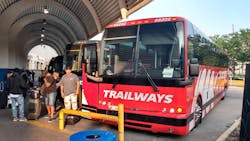New DePaul University report shows favorable spring and summer outlook for intercity bus lines
Scheduled intercity bus lines can expect a strong recovery during spring and summer, according to a DePaul University report released on Jan. 7 at the American Bus Association’s Marketplace 2022 in Dallas, Texas.
The buildup in passenger travel from August 2021 to late November of 2021 suggests that the industry’s fundamentals are strong, even though bookings have recently ebbed, severely in some cases, due to the Omicron variant.
“On the whole, the fourth quarter brought much encouraging news for intercity bus lines,” noted Joseph Schwieterman, director of DePaul’s Chaddick Institute, and publisher of the report. “Long-distance services are much better positioned than the commuter and charter bus sectors, which are suffering greatly.”
The report features several new first- and business-class services that took to the roads in the fourth quarter to lure passengers from congested airports and costly and crowded flights. RedCoach, a premium operator with a larger intra-Florida network, added first- and business-class routes in the “Texas Triangle” in October. Its new services connect Austin, Dallas and Houston. The carrier’s business-class coaches have 38 seats. Its first-class coaches are fitted with just 27 seats, roughly half the number as a typical long-distance coach.
In the Northeast Corridor, “The Jet” made its debut in early November in the New York and Washington, D.C., “Acela Corridor” using luxury buses having just 14 seats. The service, generally running twice daily from Central Manhattan to Washington’s Metro Center area, generally has fares of around $99 and features an onboard attendant and galley.
The report also notes that most business-class offerings that were available prior to the pandemic are back, including Vamoose Gold and Tripper Elite in the New York – Washington, D.C., market; Concord Coach Plus and C&J between New England and New York; and Vonlane in Texas and Oklahoma City. Rapid Overland Express has resumed its Virginia and Washington, D.C., business-class offerings. Hampton Jitney is vigorously promoting its Ambassador Class, providing an alternative to the Long Island Rail Road.
“Expect more business-class and luxury services now that airports are packed wall-to-wall with travelers,” added Allison Woodward, co-author of the report, who also noted that “airfares are rising as a result of escalating jet-fuel expenses while bus fares are largely holding constant.”
The bounce back comes at a pivotal time for the ailing industry, which generally fared worse than public transit operators and Amtrak in recent federal emergency funding bills. The American Bus Association has noted that a quarter of the bus industry has been closed on account of COVID-19. The situation is particularly severe for charter, commuter and tour operators, which have not seen the same rebound as the likes of Greyhound, Flixbus and Megabus.
Whereas some long-distance operators saw demand rise to about 80 percent of pre-pandemic bookings in November, when Omicron hit, traffic in these other sectors is only about 40–45 percent (or less) of pre-pandemic bookings in some cases.
The bipartisan Infrastructure Bill, passed by the U.S. Congress on Nov. 22, 2021, also brings good news for the sector, setting the stage for the rollout of electric buses, enhanced intermodal stations shared with Amtrak, more connecting services with trains and better roads. The bill sets aside more than $60 billion for rail-passenger improvements and $2.5 billion for electric buses.
“Intercity bus lines will benefit tremendously from the bill, since they are major users of highways and rely heavily on transfers with public transit systems and Amtrak,” noted Abby Mader, a co-author of the report.
Another favorable development was FlixMobility’s surprise purchase of Greyhound in late October. The deal excludes Greyhound’s sizeable real-estate holdings, which indicates that one of FlixMobility’s primary motives for the acquisition is to deepen its roots in the North American intercity bus market. The transaction is generating hope that renewed investment in Greyhound will follow, although specifics of such an investment are not yet known.
“The intercity bus industry seems to be on a perpetual rollercoaster,” noted Schwieterman, adding that “autumn’s ridership levels suggest it is, fortunately, back on an upward trajectory.”
The DePaul report is available for free download here.
